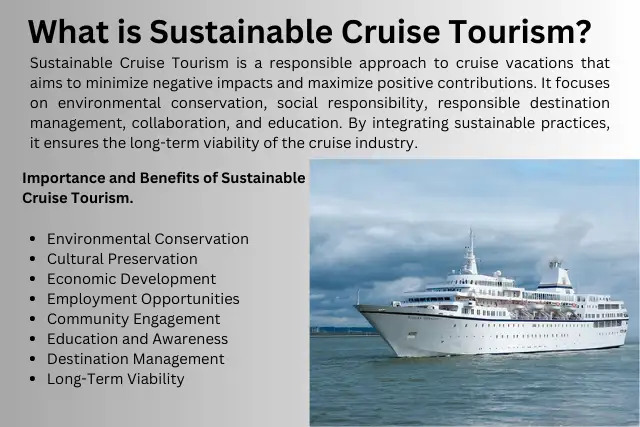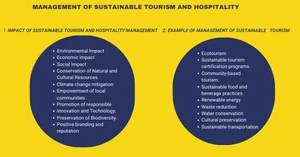
What is Sustainable Cruise Tourism?
Importance and Benefits of Sustainable Cruise Tourism
Sustainable Cruise Tourism is a responsible approach to cruise vacations that aims to minimize negative impacts and maximize positive contributions. It focuses on environmental conservation, social responsibility, responsible destination management, collaboration, and education. By integrating sustainable practices, it ensures the long-term viability of the cruise industry. In this article, we explore the principles, challenges, and benefits of sustainable cruise tourism, highlighting its importance for a more responsible and sustainable future in the cruise industry.
Read more: Uncovering the Hidden Gems of Tourist Attractions
Define Sustainable Cruise Tourism?
Sustainable Cruise Tourism can be defined as a responsible approach to the operation of cruise vacations that aims to minimize the negative environmental, social, and cultural impacts, while maximizing the positive contributions to destinations and communities. It encompasses strategies and practices that prioritize environmental conservation, energy efficiency, waste management, biodiversity protection, responsible destination management, and stakeholder collaboration. Sustainable cruise tourism promotes the long-term sustainability of cruise operations by integrating sustainable practices into all aspects of the cruise experience, including ship design and operations, shore excursions, community engagement, and passenger education.
Key principles of sustainable cruise tourism
Sustainable cruise tourism includes these following principles.
Environmental Conservation
Sustainable cruise tourism focuses on minimizing the ecological footprint of cruise ships. This involves adopting energy-efficient technologies, reducing greenhouse gas emissions, implementing waste management strategies, treating wastewater before discharge, and protecting marine biodiversity and sensitive coastal areas.
Social Responsibility
The well-being and empowerment of local communities are crucial aspects of sustainable cruise tourism. Cruise lines work towards engaging with local communities, supporting local businesses, respecting cultural heritage, and ensuring that the economic benefits of tourism are distributed fairly. Collaboration with local stakeholders and consultation with indigenous communities are vital in this regard.
Responsible Destination Management
Sustainable cruise tourism emphasizes responsible destination management to mitigate the impacts of overcrowding and over tourism. This includes diversifying itineraries, distributing cruise ship arrivals to reduce congestion, promoting off-peak travel, supporting local infrastructure development, and engaging in sustainable tourism planning with local authorities.
Collaboration and Stakeholder Engagement
The cruise industry collaborates with various stakeholders, including governments, environmental organizations, local communities, and indigenous groups, to develop and implement sustainable practices. This collaboration helps to establish guidelines, share knowledge and best practices, and ensure that cruise tourism benefits all stakeholders involved.
Education and Awareness
Sustainable cruise tourism involves educating passengers, crew members, and the wider public about the importance of responsible travel practices. Cruise lines provide information on environmental conservation, cultural sensitivity, and sustainable behaviors, promoting awareness and encouraging responsible choices among passengers.
Key Challenges for Sustainable Cruise Tourism
Some key challenges are mentioned here.
Environmental Footprint
The most pressing challenge for the cruise industry is reducing its environmental impact. Ships consume substantial amounts of fuel, contributing to greenhouse gas emissions and air pollution. Finding alternative energy sources and adopting cleaner technologies is crucial for minimizing the carbon footprint of cruise ships.
Waste Management
Proper waste management is essential for sustainable cruise tourism. Cruise ships generate vast quantities of waste, including food waste, plastics, and wastewater. Implementing effective recycling programs, wastewater treatment systems, and waste reduction strategies are vital for minimizing the negative impact on oceans and coastal areas.
Destination Management
The influx of thousands of cruise passengers to popular destinations can strain local resources and infrastructure. Overcrowding and over tourism can degrade natural and cultural heritage sites. To ensure sustainable cruise tourism, responsible destination management practices must be implemented, including limiting the number of ships at specific ports, diversifying itineraries, and engaging local communities in tourism planning.
Biodiversity Protection
Cruise ships often navigate through fragile marine ecosystems and sensitive coastal areas. The industry must work to minimize disturbances to marine life, protect coral reefs, and prevent pollution that harms aquatic biodiversity. Collaborating with marine conservation organizations and implementing strict regulations can contribute to biodiversity preservation.
Importance and Benefits of Sustainable Cruise Tourism
Sustainable cruise tourism holds great importance in the current global context, where environmental conservation, cultural preservation, and community engagement are crucial. Here are the key reasons why sustainable cruise tourism is important and the benefits it offers:
Environmental Conservation
Sustainable cruise tourism plays a vital role in protecting fragile marine ecosystems, coastal areas, and biodiversity. By implementing energy-efficient technologies, waste management practices, and conservation measures, cruise lines can significantly reduce their environmental footprint. This conservation focus helps to preserve pristine destinations for future generations to enjoy and minimizes the negative impacts of cruise operations on the environment.
Cultural Preservation
Preserving and respecting local cultures is an essential aspect of sustainable cruise tourism. By promoting responsible shore excursions and encouraging passengers to engage respectfully with local customs and traditions, cruise lines can contribute to cultural preservation. This approach fosters cultural exchange, mutual understanding, and appreciation between tourists and local communities, safeguarding cultural heritage and promoting sustainable cultural tourism.
Economic Development
Sustainable cruise tourism provides significant economic benefits to destinations and local communities. The influx of cruise passengers generates revenue for local businesses, including hotels, restaurants, tour operators, and artisans. Cruise lines that prioritize sourcing goods and services locally contribute to the economic growth of the host communities, ensuring that tourism benefits are distributed more equitably and sustainably.
Employment Opportunities
Cruise tourism creates employment opportunities in various sectors, including hospitality, transportation, retail, and entertainment. By investing in local workforce development and capacity-building initiatives, sustainable cruise tourism supports job creation and skills enhancement, empowering local communities and contributing to their socio-economic well-being.
Community Engagement
Engaging with local communities is a key aspect of sustainable cruise tourism. Cruise lines collaborate with community leaders, local authorities, and non-profit organizations to develop and implement projects that benefit the communities visited. This includes supporting education programs, infrastructure development, and cultural initiatives that enhance the quality of life for local residents.
Education and Awareness
Sustainable cruise tourism raises awareness among passengers about environmental issues, cultural diversity, and the importance of responsible travel. By providing educational materials, onboard programs, and engaging shore excursions, cruise lines can inspire passengers to become more environmentally conscious and socially responsible travelers. This increased awareness contributes to a more sustainable tourism industry overall.
Destination Management
Sustainable cruise tourism emphasizes responsible destination management practices. This involves diversifying itineraries, limiting the number of ships at specific ports to prevent overcrowding, and collaborating with local communities in tourism planning. These measures help to mitigate the negative impacts of mass tourism, preserve fragile ecosystems, and protect the authenticity and character of the destinations visited.
Long-Term Viability
By embracing sustainability principles, the cruise industry ensures its own long-term viability. As travelers increasingly prioritize sustainable travel options, cruise lines that adopt and promote sustainable practices have a competitive advantage. By addressing environmental and social concerns, the industry can build trust, loyalty, and a positive reputation among consumers, ultimately securing its future success.
Conclusion
Sustainable Cruise Tourism is a responsible approach that prioritizes environmental conservation, social responsibility, and responsible destination management. By adopting sustainable practices and promoting awareness, we can create lasting positive impacts in the cruise industry. Let’s embrace this approach for unforgettable experiences that prioritize the planet and the well-being of destinations and communities.




